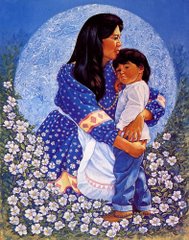Native wisdom
by Bruck Wark
The Coast - October 25, 2007
When I wrote this book, I knew the contents would cause great pain for many Canadians of English descent," reads the first sentence in Daniel Paul's We Were Not The Savages. "It must be discomforting to come to grips with the fact," Paul continues, "that many of your ancestors were not always the kind, gentle folks that some historians have depicted, but were in fact barbaric." Paul's book chronicles the persecution of the Mi'kmaq people. It's a story filled with racism, attempted genocide, enforced poverty, starvation, dispossession, and finally, systematic attempts to wipe out the Mi'kmaq language and culture. "The atrocities recounted in this book have not been placed here to engender pity," Paul writes, adding he hopes his book will persuade people to use whatever power they have to see that Canada makes amends for the wrongs of the past.
Judging by the recent actions of Stephen Harper's Conservative government however, the time has not yet come to make those amends. Last month, Canada voted against the United Nations Declaration on Indigenous Rights even though it's non-binding and therefore largely symbolic. The declaration calls on countries to uphold indigenous peoples' rights to their lands and resources. It urges states to respect aboriginal languages and cultures and to ensure that native peoples have the right to self-government, control over their schools, access to clean water, adequate housing and social services.
The declaration took 20 years to negotiate, but in the end, Canada joined the US, Australia and New Zealand in voting against it. BC Chief Stewart Philip noted that the only votes against the declaration were from the "four first world countries that have become prosperous through the exploitation of the lands and resources of the indigenous peoples."
"Canada has been very two-faced, first in line to criticize other countries for their neglect of human dignity and human rights," Daniel Paul tells me. He adds that Canada's position is in line with the thinking of Tom Flanagan, a long-time Harper adviser. Flanagan's book First Nations? Second Thoughts advocates the assimilation of native peoples into mainstream society. Flanagan argues that "European civilization was several thousand years more advanced than the aboriginal cultures" and therefore, European colonization of North America was inevitable, even justifiable.
That kind of thinking may also explain the Tories' decision to scrap the $5 billion Kelowna Accord, a 10-year deal the Liberals signed with native leaders in 2005 to improve living conditions on reserves. The Accord was approved by all provincial and territorial leaders, but Harper's Conservatives say they want to pursue their own approach. Assembly of First Nations chief Phil Fontaine warns without the Accord, aboriginal poverty will only continue.
Meanwhile, the Tories have announced they will re-introduce a bill imposing the Canadian Human Rights Act on native reserves, even though a parliamentary committee rejected it last July. A long list of witnesses, including the native women the bill is supposed to help, warned it did not contain protections for aboriginal and treaty rights. Native leaders fear, for example, that without this protection, non-natives could launch human rights complaints claiming they were discriminated against by not having access to native lands or traditional hunting and fishing rights.
The Canadian Bar Association which represents lawyers joined with native leaders in calling on the Conservatives to consult with native leaders, but so far, the government has refused.
Ontario Chief Dan David told the committee he found it ironic that the Harper Tories were trying to portray themselves as champions of human rights while, at the same time, opposing the UN Declaration on Indigenous Rights.
Last week, Harper promised an apology for the treatment of native children in those infamous residential schools.
If he really wants to make amends, his government should also sign the UN Declaration [on Indigenous Rights ], then work hard to implement its many provisions. Given the wrongs of the past, it's the least Harper can do.

No comments:
Post a Comment